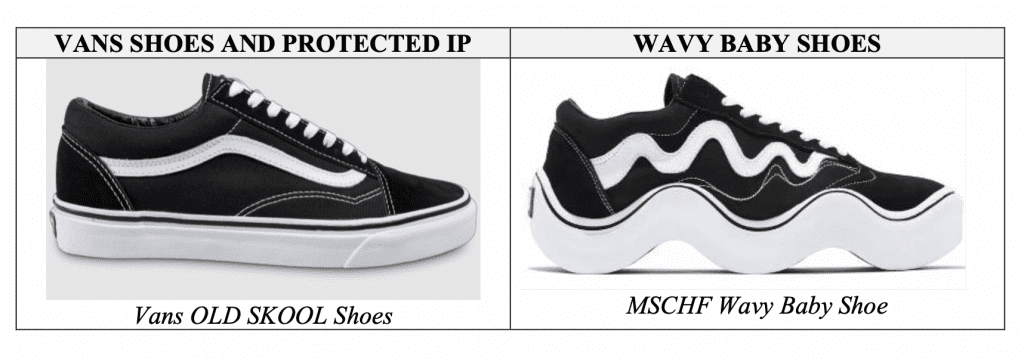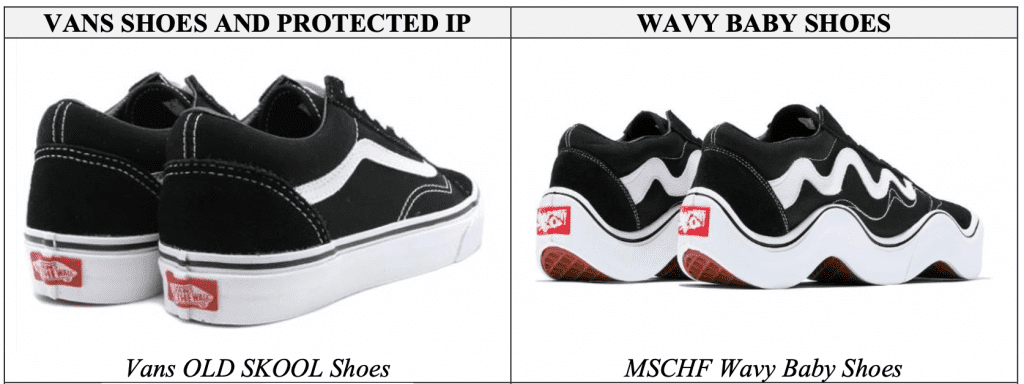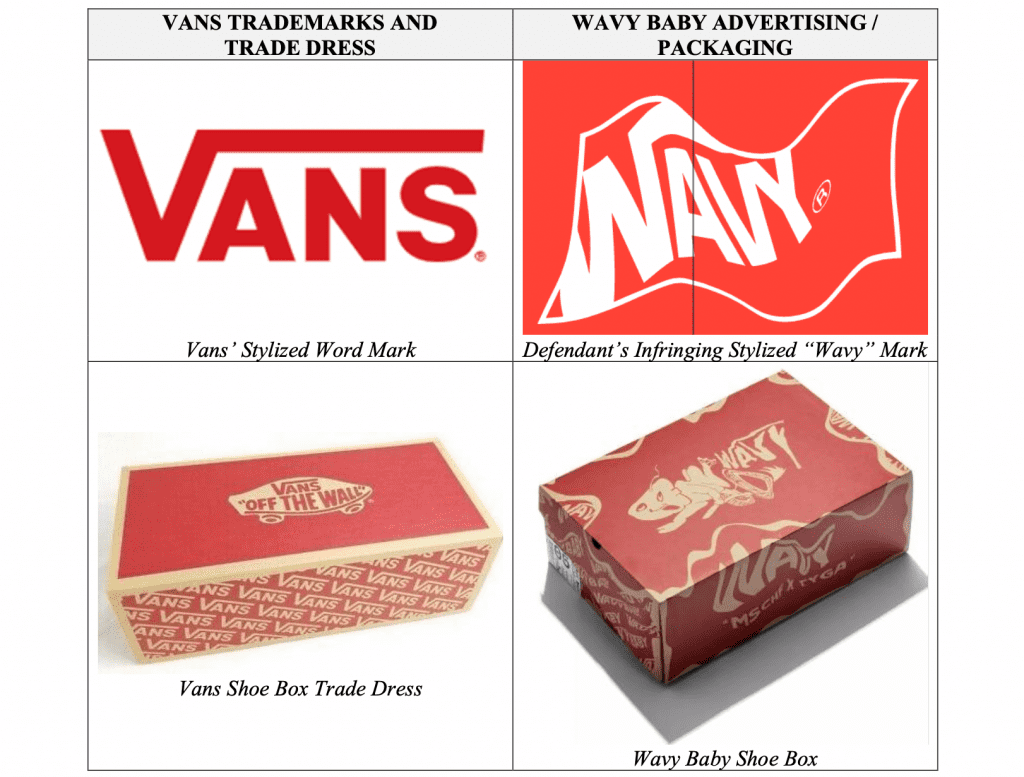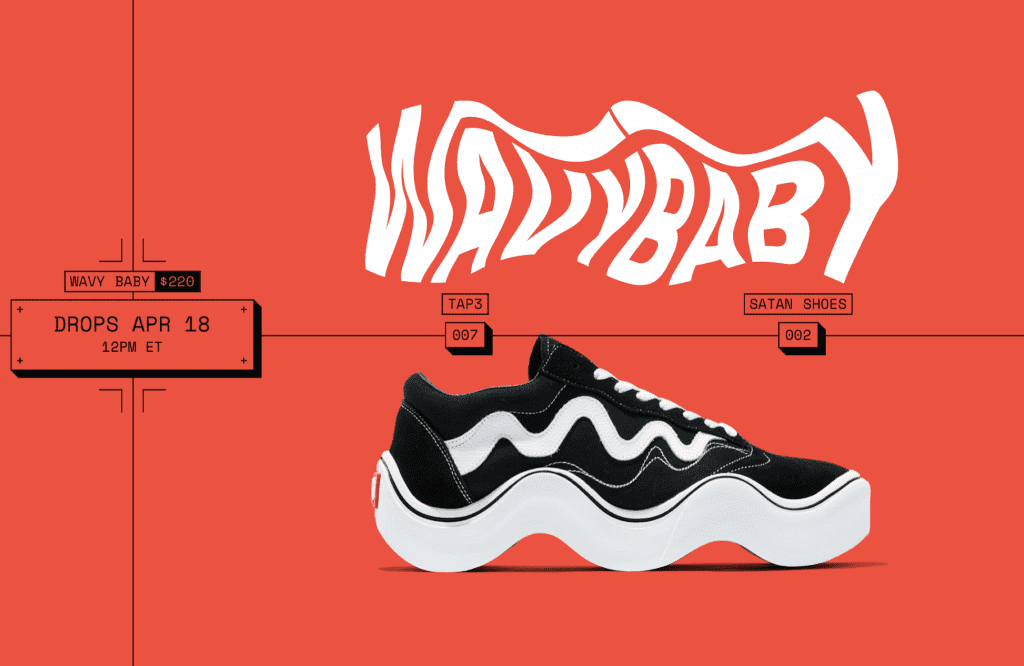Just over a year after settling the trademark-centric lawsuit waged against it by Nike, MSCHF has landed on the receiving end of a new lawsuit, this time from Vans. According to a 57-page filing with the U.S. District Court for the Eastern District of New York on Thursday, Vans and its parent company VF Corp. allege that “in spite of, or perhaps due to, [its] knowledge of Vans’ rights and the substantial value of the Vans trademarks and trade dress, MSCHF recently embarked on a campaign to piggy-back on Vans’ rights and the goodwill it has developed in its iconic shoes” by offering up a shoe of its own that “blatantly and unmistakably incorporates Vans’ iconic trademarks and trade dress.”
In the newly-filed complaint, Vans claims that by way of the not-yet-released Wavy Baby sneaker, MSCHF is willfully infringing its trademark and trade dress rights in the 40-year-old OLD SKOOL shoe, including the Side Stripe trademark. “The combination of elements comprising the OLD SKOOL Trade Dress is distinctive, and the public recognizes and understands that the OLD SKOOL Trade Dress distinguishes and identifies genuine Vans brand shoes,” the footwear brand asserts. “As a result of Vans’ extensive use of the OLD SKOOL Trade Dress,” including sales of “hundreds of millions of shoes bearing the side stripe mark,” which have accounted for “tens of billions of dollars in revenue,” Vans claims that it “has built up and now owns extremely valuable goodwill that is embodied by the OLD SKOOL trade dress.”
(Vans describes its “OLD SKOOL Trade Dress” as “a distinctive combination of source- identifying elements,” including: “(1) the Vans Side Stripe Mark on the shoe upper; (2) a rubberized sidewall with a consistent height around the perimeter of the shoe; (3) the uppermost portion of the sidewall having a three-tiered or grooved appearance; (4) a textured toe box outer around the front of the sidewall; (5) visible stitching, including where the eyestay meets the vamp; and (6) the placement and proportion of these elements in relation to one another.”)
Vans also maintains trademark rights in and registrations for “other unique aspects” of its well-known sneaker, including a “distinctive stitching pattern on a sneaker,” its “signature waffle” shoe sole, and the placement and design of the heel tab. And still yet, Vans asserts that it has protectable rights in its distinctive shoe boxes, namely, “the unique red and brown shoe box [which it adopted] in June of 2014, and has since sold over one billion pairs of Vans shoes, each inside of Vans’ iconic red and brown shoe boxes.”

Against this background, Vans alleges that MSCHF has sought to “skip the significant investments required to develop original, authentic, and high-quality shoes, and instead chose to free-ride off Vans’ reputation and popularity.” MSCHF and rapper Tyga have “aggressively marketed” the Wavy Baby shoe and plan to make it available for purchase on April 18, per Vans, in order to “intentionally confuse consumers as to [the sneakers’] source, or to suggest that [it] has sponsored or otherwise approved of the infringement, by mimicking [its] trademarks and trade dress,” and in order to profit from “the reputation and goodwill earned by Vans for over half a decade.”
Specifically, Vans claims that MSCHF has “copied the shape and location of the side stripe mark, in addition to copying [its] iconic black shoe with white side stripe mark, on the shoe upper.” Beyond that, the allegedly infringing Wavy Baby shoe “deliberately incorporates another iconic feature of the Vans OLD SKOOL shoe: the square, red and white heel logo on the back of the shoe,” per Vans, while also co-opting “Vans’ trademark Waffle Sole, as well as the Vans footbed logo.” Finally, MSCHF also has “copied Vans’ trademarks and trade dress in connection with advertising and product packaging for the Wavy Baby shoe,” namely, by way of the lookalike shoe box.
While the shoes are “confusingly similar” when considered in a side-by-side capacity, Vans contends that when they are “encountered at separate times, as most consumers will do in the marketplace or in the post-sale context, the parties’ respective designs are even more confusing.” Such potential for confusion is heightened, Vans asserts, given its own practice of collaborating with “other designers, companies, or celebrities” and the fact that it enables consumers to “design their own colorway while utilizing the OLD SKOOL Trade Dress” by way of its “Vans Customs” service in its website.

Beyond “mimicking the design of Vans’ shoes,” Vans alleges that MSCHF has taken “additional affirmative steps in an attempt to suggest an association between [itself] and its infringing shoe and Vans,” including using a stylized “wavy” mark that is confusing similar to Vans’ stylized word mark – complete with the ® symbol, which Vans says “deceptively suggest[s] that the mark is federally registered.” (In reality, “MSCHF has not even applied for registration of the ‘wavy’ mark, let alone actually obtained federal registration.”)
In a further attempt to hijack the ethos of its brand, Vans claims that MSCHF uses imagery to market the allegedly infringing shoe “that is intended to evoke a ‘skate’ or ‘retro’ image.” For example, Vans states that “MSCHF’s marketing of the infringing Wavy Baby shoe relies heavily on images of individuals with skateboards.”
Despite it attempts to settle the matter out of court, including by sending a cease-and-desist letter to Tyga (who is not named as a defendant in the case) on April 5 and MSCHF on April 6, Vans claims that they have been unable to agree on an appropriate resolution. As such, Vans has lodged claims of trademark infringement, unfair competition, trademark dilution, and unfair trade practices under New York State law against MSCHF, seeking monetary damages (including any profits should MSCHF actually go ahead with its release of the sneakers on April 18) and a court order barring MSCHF and any related entities from advertising and offering up footwear that infringes its trademark.
In a lengthy statement on Thursday, MSCHF co-founder Daniel Greenberg noted that Vans reached out ahead of the suit in an attempt to “proactively settle,” seeking, among other things, “half the profits and also four pairs of shoes for themselves.”
The most interesting element of his statement and of this lawsuit (in my opinion), however, is the part where Goldberg appears to clearly position the company to make a commentary-centric defense in order to shield itself from Vans’ trademark claims, stating, “Sneaker companies are in a constant cycle of riffing on each other. Standard shoe industry practice is: steal a sole, steal an upper, change a symbol. Wavy Baby is a complete distortion of an entire object that is itself a symbol.” (Goldberg is not necessarily wrong; the sneaker space is rife with litigation between giants, alleging infringement in lieu of innovation. Nike’s ongoing ITC battle over adidas’ knitted shoes, for example, comes to mind.)
Additionally, Goldberg claims that the Wavy Baby shoe is “transformational above and beyond anything Vans would ever attempt.”

The suit comes just over a month after MSCHF announced that it would launch a sneaker brand of its own, MSCHF Sneakers, seemingly parlaying the viral attention it gained from its lawsuit-inducing Satan Shoes into a formal footwear venture. As we previously noted in connection with MSCHF’s new footwear venture, it will be interesting to see how this approach of “poking the bear,” which appears in many cases to deliberately court the potential for litigation, plays out as the company sets its sights on becoming a bona fide brand and scaling the volume of their operations.
Should MSCHF really begin to move away from their one-and-done drops, at least when it comes to the footwear category, the company stands to chip away at the main defense that it set out in response to the Satan Shoes case: that its sneakers fall more within the realm of an “artistic and expressive” project than the world of purely commercial footwear. It is not yet clear if – or how – the company would be able to straddle the line between expressive and commercial works.
It will also be interesting to see how much longevity MSCHF’s media-by-litigation model has before it begins to cause fatigue among consumers, who might begin to view such stunts as pure gimmick. The company shuns traditional advertising efforts, and thus, is largely reliant on the hype that surrounds threats of litigation and actually-initiated litigation in response to its offerings.
Vans’ case against MSCHF also comes as the footwear brand is facing off against Walmart for allegedly infringing its OLD SKOOL trademarks. The sneaker company landed a win in the latest round against the retail titan, with the Judge David Carter of the U.S. District Court for the Central District of California granting Vans’ motion for a preliminary injunction on the basis that “Vans is likely to succeed in showing that its trademarks and trade dresses are valid and protectable,” and given that “Vans’ evidence of loss of market control, consumer confusion, and the poor quality of Walmart’s shoes is sufficient to establish that [it] is likely to suffer irreparable harm absent injunctive relief.”
The case is Vans, Inc. v. MSCHF Product Studio, Inc., 1:22-cv-02156 (EDNY).














